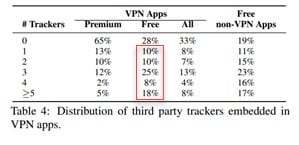
There are many free VPNs in the marketplace. If you have listened to the news recently, you have probably heard that governments are routinely banning apps from other countries. Luckily, there are ways to get around those kinds of restrictions. Some examples of those countries are India, China, Vietnam, and even the United States. One of the significant concerns about some of the Chinese apps has to do with national security.
While there are several different methods to circumvent restrictions, the easiest and best way to get around them is to connect to a VPN server. If you are new to the community, VPN stands for Virtual Private Network. That is stand-alone software that masks your IP address and makes any blocking software think you are in another location. It also provides a layer of encryption to help protect your privacy.
Recently, many free VPN companies have appeared in the community to help meet the demand. Most of these companies make lofty promises about keeping you safe, and some state they have a no-logs policy. One of our favorite promises is they are mostly free of third-party ads (even though the company may be selling your data for marketing purposes). Unfortunately, they are using an alternative set of facts. There is a saying that states, “If the product is free, you are the product.” That is true when you are looking at free VPNs.
Remember that most of these companies are not just being nice by offering you something free. Instead, they are using tools to get valuable information. While they may tempt you with their claims, let’s take a look at the reasons free VPNs are bad for your privacy.

- A majority of free VPNs contain malware or trackers – One of the big reasons to use a VPN is to stop tracking. However, a report issued by the International Centre of Investigative Reporting shows that 72% of all free VPNs have at least one tracker. That means you may be worse off using one then not using one. VPNs are expensive to run and maintain. If you are using a free service, they have to earn revenue in some fashion. These trackers will keep track of the sites you visit and when you connect to them. Additional information may include how long you stay on a page as well as your IP address, computer or device information, and more.
- Not as safe – This is a big one. With premium products, you have VPN protocols that use 256-bit encryption or equivalent. If you are using a free service, you are lucky to get 128-bit if they are encrypted at all. That means it is easier for someone to intercept your encrypted messages and decipher them. That defeats one of the purposes of using a VPN to begin with.
- May insert ads – One thing we have seen is what we call an ad swap. In some free VPN services, they will block advertisements on sites, only to substitute the ads with their own. Another trick is the use of aggressive marketing pop-ups. Those can be so prolific that one VPN got an FTC complaint in 2017 because of that practice.
- The no-logs myth – Even though the free VPN company may tell you that they do not keep logs, many do. That is a big source of revenue for them. They sell your information to the highest bidder.
- Questionable jurisdiction – Although you may not think about this one, where the VPN company is located makes a difference. That is especially true if the company is located in one of the 14 eyes countries. Since they keep logs, they will turn over information to law enforcement if requested to based on the rules of the local government.
- May infect your device with ransomware or malware – Free VPNs can infect your favorite device with ransomware or malware. In fact, there have been recent accounts of scams to do that. The designers will lure you in with the promise of a free VPN so they can take advantage of your information. Sometimes, their only goal is to swindle users out of their money. Instead of protecting you, it does the opposite. Other times the threatening software will be bundled with free VPN app downloads on third party sites.
- Bandwidth selling – This common practice allows paid members to use the processing power of your computer for their benefit. That will slow down your connection and leave you vulnerable. In 2015 it was reported that Hola sold their VPN users’ bandwidth to be used in botnets.
- Overreaching permissions – Some free VPNs ask for permissions on your mobile device. Some of the ones we have seen ask for permissions to your camera, gallery, and more. There is no reason for any VPN to have that kind of access.
- Company may be a P2P VPN – Although VPNs usually run in a standard way, others don’t. An example of that is Hola VPN. In 2015 it was discovered that the service free users were used as an endpoint for every other user. According to a report by researchers, they would track you across the web, sell your information, use your computer as a botnet, or even use your computer for illegal activities that that could leave you in legal trouble.
- Parent Company Ownership – Going back to what we said in the first paragraph, there are national security concerns over Chinese apps including VPNs. If you do some digging, you will find many of the popular free VPNs are under Chinese control. Since VPNs are strictly banned in China, you may wonder why others are allowed to operate. The answer is they are useful to the Chinese government. Those include Turbo VPN, Thunder VPN, and many others.
As you can see, using a free VPN is far from free. While you will not spend money, it will cost you in other ways. The best way to protect yourself is to use a VPN from a trusted provider. That way, you can keep yourself safe and keep your information private.
